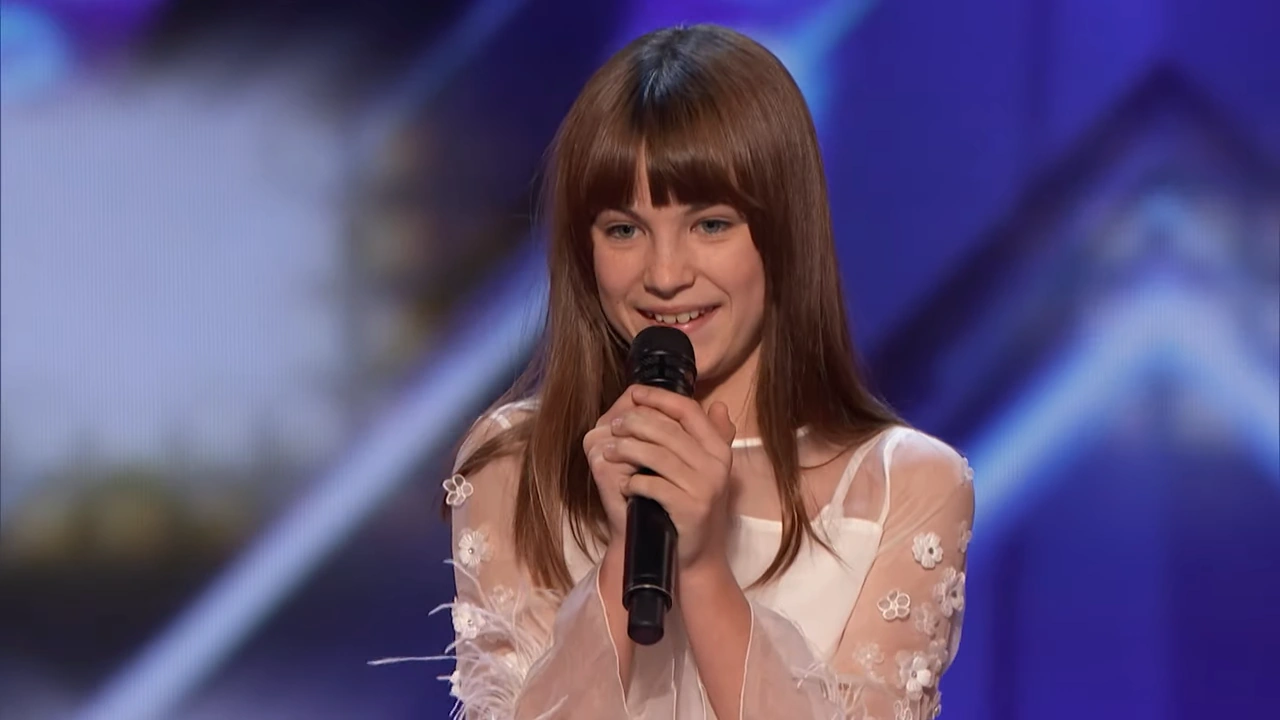The auditorium buzzed with chatter, the kind that always filled the air before the start of talent show auditions. Bright lights beamed down onto the polished stage, casting a nervous glow on every hopeful performer who stepped into the spotlight. The audience shuffled in their seats, some sipping sodas, others scrolling through phones, ready for an afternoon of entertainment.
Backstage, 13-year-old Sophie Miller clutched the microphone with both hands. Her palms were sweaty, and her heart pounded so hard she could feel it in her throat. Sophie had dreamed of this moment for as long as she could remember. Music wasn’t just a hobby for her—it was her anchor, her secret escape. She had practiced every single day after school in her bedroom, her voice rising above the hum of the small suburban neighborhood where she lived with her mom.
Her mom, Laura, stood a few feet away, smiling despite the obvious nerves she shared with her daughter. “Remember, sweetheart,” she whispered, adjusting Sophie’s hair. “Just sing like you do at home. You don’t have to prove anything to anyone—just tell your story.”
Sophie nodded, though inside she wasn’t so sure. She had never performed in front of more than a school talent show crowd, and that was just a hundred people. Now she was facing thousands—including three of the toughest judges in the country, whose opinions could make or break careers.
When Sophie finally stepped onto the stage, the room went oddly quiet for a moment. She looked so small standing in the center, dwarfed by the massive theater. Dressed in a simple blue dress and sneakers, she didn’t look like the kind of performer people expected to dazzle them. The audience leaned forward curiously, some already smiling in that skeptical, “this should be interesting” kind of way.
The head judge, Simon, adjusted his glasses and arched an eyebrow. “What’s your name, love?”
“S-Sophie. Sophie Miller,” she stammered.
“And how old are you?”
“Thirteen.”
The crowd chuckled softly, and even the other judges exchanged looks that suggested doubt. Sophie noticed the laughter, the way people seemed to assume she would be just another kid fumbling through a pop song. Her hands trembled.
Simon continued, “What are you going to sing today?”
“A song called Rise Again,” Sophie said, her voice steadier now. “It’s one I wrote myself.”
That earned a raised brow from the panel. Writing original music at thirteen was rare. Still, the chuckles returned, scattered through the crowd. A few people even shook their heads, clearly expecting her to crash and burn.
But then, the backing track started—just a soft piano—and Sophie took a deep breath.
The first note that came out of her mouth changed everything.
It was low, steady, and filled with emotion far beyond her years. The laughter cut off instantly, replaced by silence so sharp it could have been cut with a knife. Her voice rose, each lyric carrying raw honesty about struggle, about falling down and finding the courage to rise again.
The judges leaned forward almost in unison. Simon’s skeptical expression melted into something resembling awe. The other judges, Maria and Trish, exchanged glances, their jaws slightly open.
By the chorus, Sophie’s voice soared. It wasn’t just powerful—it was soulful, textured, layered with a kind of pain and hope that could only come from someone who had lived more than her age suggested. Audience members stopped fidgeting. Phones lowered. People stared, eyes wide, captivated.
Backstage, Laura covered her mouth with her hands, tears welling as she watched her daughter blossom under the lights.
As Sophie reached the bridge of her song, she closed her eyes, her voice cracking just enough to show vulnerability. That imperfection only made the performance more real. She poured everything into those last notes, finishing with a trembling, powerful sustain that echoed across the hall.
The silence afterward was absolute. Then, a heartbeat later—the auditorium erupted. Cheers, whistles, thunderous applause. People jumped to their feet in a standing ovation.
Sophie blinked, dazed, clutching the mic as though it might anchor her to the moment.
Simon leaned into his microphone, his voice carrying the kind of weight that could define futures. “Sophie Miller… I don’t know what I expected when you walked on this stage. But it wasn’t that. That was extraordinary. That was… breathtaking.”
Maria added, her voice thick with emotion, “You just reminded us why we love music. That wasn’t just singing—that was storytelling. You have a gift, Sophie.”
Even Trish, who was usually the most reserved of the panel, wiped a tear from her eye. “At thirteen… to sing like that? You’re not just talented. You’re one in a million.”
The crowd roared again, and Sophie’s cheeks flushed. She whispered into the microphone, “Thank you,” though her voice was almost lost under the cheers.
Backstage, Laura ran to meet her the moment she stepped offstage, wrapping her daughter in a hug. “I told you,” she whispered, tears slipping down her cheeks. “You just had to tell your story.”
For Sophie, it wasn’t just about winning or impressing the judges. In that moment, she realized she had done something more. She had silenced doubt, turned laughter into awe, and proved to herself that her voice—the one she had kept hidden for so long—was strong enough to reach the world.
And as the cameras flashed and the applause thundered behind her, Sophie Miller, just thirteen years old, knew this was only the beginning of her journey.
